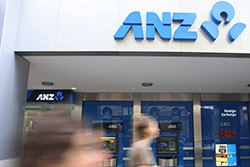
What’s happening at our banks?
What’s happening at our banks? ANZ reports.
Start by watching this video from early February this year at the 3 minute mark.
Reading press articles today about the banks this morning you’d be forgiven for thinking that there are new metrics being used to value banks. One article observed, “It is time for Australian investors to revisit the way they look at bank stocks and recognise that the search for yield means the valuation game has changed. The conventional methods used to value banks no longer apply.”
The article suggests that investors should look at the banks on a ‘yield driven valuation’. I am not sure about that myself, but we do know that banks are delivering now on the growth that we have been chatting with you about since October, when a friend of mine in the shopping centre business told me the turnover of his retail tenants was rising.
Analysts missed the quick turnaround in retail earnings and the jump in their share prices. Those who bought early benefited as they played catch up with their numbers. As the video above shows, we predicted (it’s the only predicting we do) that the same thing would happen with their analysis of the banks.
Yes it is true that solid and reliable yields have been an important driver of short term popularity of the banks. Further ‘sustainable’ gains however will necessarily be less likely based on yield differentials (between shares and term deposits) being compressed, rather, they will have to be based on earnings growth as credit growth starts to expand again.
At present credit growth is still benign and cash profits that were previously retained by the banks were employed to drive credit growth. With credit growth virtually non-existent, the banks are raising their payout ratios and retaining less.
ANZ this morning announced Cash NPAT for the half that was three per cent ahead of market estimates and it also announced a step up in the payout – to 65-70% from 65%. ANZ’s cash NPAT of $3182m exceeded consensus estimates of $3109m. Much of the reason for the difference between actual and analyst estimates this time around appear to be due to bad and doubtful debts being lower – perhaps the first sign of improving conditions. Earnings per share was higher than expected, the net interest margin was stable and costs declined by 8 per cent.
We expect these improving signs to continue until the economy slows (as a result of the end of the mining booming and successive government policies that killed manufacturing, retailing, tourism and food production). The result is rising unemployment – because nothing else exists to provide a viable employment alternative and the government taxes whatever little industry is left.
I love silly shareholders. That way I can profit on their mistakes. Growth prospects for banks are lower, so what happens? The shareprice goes up. The remaining shares in banks that I haven’t sold yet are going to be sold very soon.
Silly, simple minded investors that are chasing yield. But then again, its simple, many people don’t want to spend hours a week analyse sharemarkets.
But I do like how banks and miners are returning more profit back to shareholders instead of wasting the money. However, I think they were harsh on Marius Kloopers who did a good job. BHP have been a great company for years and for fund managers like Blackrock to say to BHP to not waste money when they had a good track record is a bit harsh. RIO is a very different story about wasting money.
Hi Roger
I have sent several requests for one of your staff to contact me regarding investing with the Montgomery Fund, but have failed to recieve any reply. This seems to be the only way I might get a response.
Many thanks in advance
Hi Melwyn,
I apologies personally for the failure of our office to respond. There are only two possible reasons. The first is that we didin’t receive your email, because it was sent to our spam folders automatically by our servers. The second possibility is that we received your email, replied to it, but your servers put it in your spam or junk folder. rest assured, we’d be delighted to talk with you. Our office number is (02) 9692 5700. Ask for me or David Buckland. In our absence you can speak with Tim Kelley, or Russell Muldoon or Madeleine Taylor.
“It is time for Australian investors to revisit the way they look at bank stocks and recognise that the search for yield means the valuation game has changed. The conventional methods used to value banks no longer apply.”
I remember hearing similar comments about how traditional valuation techniques would not work for a particular type of time and investment. That tech boom in the early 2000’s went well.
I know your funds don’t have any banks, Roger, but if they did, what signs would you be looking for to sell them?
When they are expensive! The trend at present is based on yield and the companies are playing the rising pay out ratio card, which of course drives the share price higher and the TSR – which in turn may have something to do with bonuses…
Thanks Roger.
Yes tough times ahead. Seems the GFC didn’t arrive in Australia when it happened to the US and Europe. But it a years time we will have caught up with them.